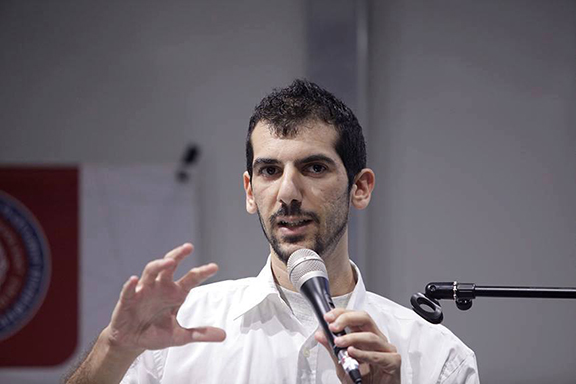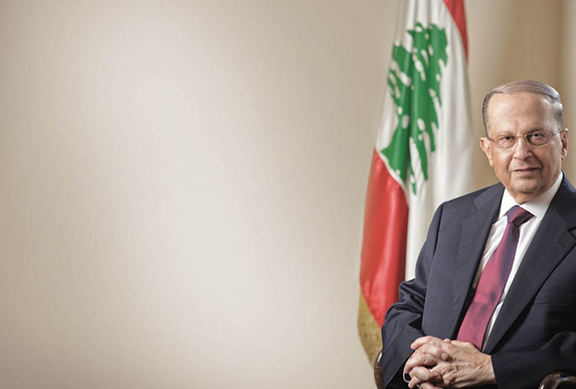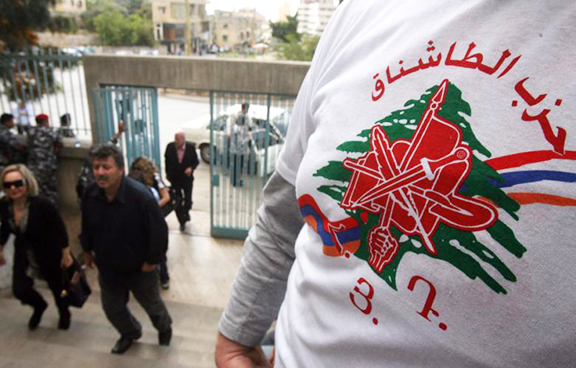An Interview with Yeghia Tashjian
BEIRUT, Lebanon (Armenian Weekly)—Michel Naim Aoun was elected President of Lebanon on October 31 at the 46th electoral session of the Lebanese Parliament. Lebanon had been without a head of state after President Michel Suleiman stepped down as president at the end of his term in May 2014, resulting in a deadlock as the Parliament failed to elect a successor for more than two years.
Upon Aoun’s election, Chair of the Armenian Revolutionary Federation (ARF) Central Committee of Lebanon and head of the Armenian Bloc of the Lebanese Parliament, Member of Parliament Hagop Pakradouni called the Lebanese presidential elections a “historic moment,” which will help repair the future of Lebanon.
“I would like to call the presidential elections a historic moment, which will turn the pages of the past and look towards the future. We must all work together in order to repair all that was damaged in the past,” he said.
President Aoun has been in a political alliance with the ARF since 2005.
The Armenian Weekly recently spoke to Lebanese-Armenian political activist, researcher, blogger, and the founder of the New Eastern Politics forum Yeghia Tashjian, to discuss Aoun’s election and its implications for the Armenian community of Lebanon.
Yeghia Tashjian holds a B.A. in political science from Haigazian University in Beirut, Lebanon and is currently the regional officer of Women in War and research assistant at Armenian Diaspora Research Center at Haigazian University.
Below is the interview with Tashjian.
***
Rupen Janbazian: Since Lebanese President Michel Suleiman left office in May 2014, Lebanon’s political blocs failed—time and time again—to elect his replacement. Why was this the case?
Yeghia Tashjian: In Lebanon, all parties—some more than others—were responsible for the presidential vacuum. A similar, shorter vacuum occurred in 2008, and as a result, the country entered a period of armed clashes between Hezbollah and its supporters and their opponents. In less than two days, the Sunni areas in Beirut were under Hezbollah’s military control. Even the army was unable to interfere and stop the violence. As a result of Qatari suggestion, a ceasefire was finally reached. Both the “March 8” and “March 14” alliances reached a compromised agreement—General Michel Suleiman was elected as President and a unity government was formed. But the problems and challenges that the Lebanese political confessional system had not been addressed.
With the escalation of the Syrian crisis, the rivalry between the two major alliances polarized; consensus on a new President was almost impossible. Both alliances had many candidates each supported by a party or even regional states, which put things out of the control of Lebanese lawmakers. Today’s elections end a two years vacuum after 45 failed attempts to form quorum. The reason for that is that more than a third of the Members of Parliament have intentionally skipped 43 out of the last 45 presidential election sessions due to the reasons mentioned above.
R.J.: Lebanon’s latest presidential elections lasted over two years. That changed on October 31, when Michel Aoun was elected with 83 votes. What does Aoun’s election mean for the future of Lebanon?
Y.T: It is still early to judge, but at least there is no longer a presidential vacuum. State institutions can start functioning. We have a President that can sign official papers and appoint key senior officials. Moreover, in a parliamentary system like Lebanon, the mechanism of checks and balances between the three state branches is important. The head of the state has limited constitutional ability to perform it. Since the 1989 Taef agreement, the conditional rights of the President are quite limited—he cannot even appoint ministers. However, the President now has a parliamentary bloc which can help him in his decisions.

Yeghia Tashjian, Lebanese-Armenian political activist, researcher, blogger and the founder of the New Eastern Politics forum
R.J.: Former Lebanese Prime Minister and Aoun rival Saad Hariri decided to said that he decided to support Aoun less than two weeks ago, in order to “protect Lebanon, protect the [political] system, protect the state and protect the Lebanese people.” What do you think he meant by that?
Y.T.: It was clear for Saad Hariri that he had little choice left, especially when his major Christian ally, Samir Geagea supported Aoun’s presidency. Hariri did not have a choice but to support Aoun or continue his support to Suleiman Frangieh. Frangieh was known for his friendly relationship with the Syrian President Bashar al Assad. This was controversial for Hariri since the majority of the Sunni population in Lebanon was supporting the uprising against Assad’s regime in Syria.
If Hariri would have continued supporting Frangieh, he may have lost the Sunni vote. It would also be impossible to reach a compromise between Frangieh and Aoun. Both were aiming the presidency and not ready to compromise, even though both were in the same political alliance.
R.J.: President Aoun has been in a political alliance with the Armenian Revolutionary Federation (ARF) since 2005. Will this alliance continue? How will Aoun’s presidency affect the Armenian community?
Y.T.: In 2005, both parties were searching for strong and new allies. The ARF was in a weak position after it had lost its candidates in Beirut in favor of the Hunchag and Ramgavar parties and Hariri’s Armenian candidates. The ARF boycotted the elections in the capital. There was a fear the party would be defeated in Metn, where majority of Armenians are concentrated. Thus, the ARF was searching for a strong Christian partner. The Free Patriotic Movement (FPM), headed by General Aoun, was marginalized by his former Christian areas and he wanted to establish a new alliance. Thus the two parties established an electoral alliance, which was later consolidated and turned into a political alliance.
When former PM Fuad Siniora rejected the participation of ARF in the cabinet, Aoun refused to join the government. Later on, with the entrance of the ARF and FPM into government, the Armenian representation in the public sector was secured, especially in municipalities and the army.
I think the alliance will continue in the near future, but with the coming parliamentary elections, Aoun may face an important challenge. In the previous elections, some Christian political parties, such as the Lebanese Forces, wanted to include the Armenian seats in its parliamentary bloc, as it once happened in Zahle. There were rumors that it may be repeated in Beirut too. Therefore, the electoral alliance in Beirut will be challenging, especially for the major Christian political parties including the Armenian political parties.
But all these are depended on the electoral law. All the Armenian lawmakers voted for General Aoun—he had good relations with the Armenian parties. He had also organized commemorations for the Armenian and Syriac Genocides. Nonetheless, the main interest of the Armenian community—represented by its middle class—is economic and political security. Will the new President provide these? I think it will be based on local and regional issues.
R.J.: What are your hopes for Aoun’s time in office? Do you believe he will be able to lead Lebanon to a brighter future?
Y.T.: It is very early to judge whether we will see a bright future. People have already started to make certain assumptions. They too have a point. The last decade proved that the political system is unable to bring a positive change—or at least reform—to institutions. Everyone cries for change, but no one is ready to take the initiative.
The President will face both domestic and regional challenges. President Aoun, while taking the constitutional oath, said the following: “I came at a hard time, and there is a lot of hope that I will overcome difficulties…” He also stated that Lebanon will have an “independent foreign policy.”
With regional rivalry reflecting on different Lebanese political parties and sects, it is difficult to have an independent or—at the very least—unified vision on the foreign policy. One of the main reasons is country’s official stance towards Hezbollah’s military intervention in Syria.
What I am worried about is diplomatic and economic escalation from Arab Gulf states or some EU countries that may further isolate Lebanon and push it towards the pro-Iranian camp. Lebanon, with its diverse cultural, religious, and political heritage, needs to declare neutrality regarding regional affairs and declare a foreign policy similar to what President Fuad Chehab declared during the peak of the regional cold war era.
Domestically, the President may face fierce opposition regarding the new electoral law, economic reforms, and a solution to the Syrian refugee crisis.
“The tragedy of it is when [political factions] disagree we go into paralysis. Then, when they agree, we go into collusion mode, and in most cases this is at the expense of citizens. This is the trap we live in until we are able to break this monopoly of power,” Sami Atallah, Executive Director of the Lebanese Center for Policy Studies recently said.
At the end of the day, Lebanon needs a national agenda. We don’t have one. We live in a country that has multiple foreign and domestic policies, but not a single unified national policy.
Source: Asbarez
Link: The Lebanese Presidential Elections and Its Implications for the Armenian Community


